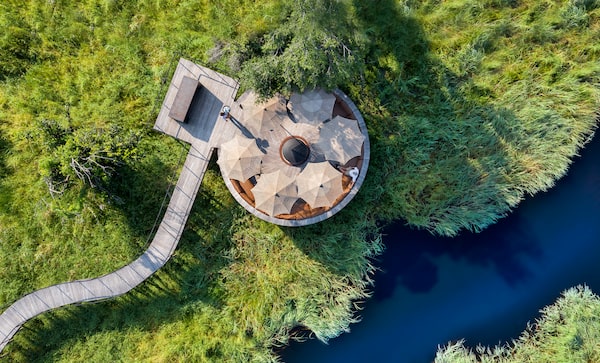
In New Zealand, Nest Treehouses are part of a national push to ensure tourism is sensitive to the environment and local culture.Handout
Liz and Andrew Hayes built a tiny treehouse on a remote farm in a part of New Zealand where few tourists venture, yet they still welcome a steady stream of visitors who come to spend a night or two in the treetops. Their guests visit for the sense of stillness that comes from soaking in a tub under a canopy of Radiata pines and marvelling at the beauty of the South Island’s Hakataramea Valley. They sip local wines (Maude Methode Tradionelle, an elegant aperitif with hints of apple blossoms and citrus, is a favourite), snuggle in alpaca blankets and sample the local salmon, artisanal cheeses and freshly baked goods dropped at their door.
Nest Treehouses only opened last April and its guest book to date has been primarily filled with glowing reviews from Kiwis who love the idea of a luxury accommodation in the middle of nowhere that effortlessly combines sustainability with style in a natural setting. Since 2020, New Zealand’s borders have been closed to international tourists, but at the end of April the country has said it will welcome back fully vaccinated travellers. The Hayes have begun fielding queries from adventure-seekers from as far away as China, the United States and Britain.
“We built Nest Treehouses because we believe the discerning traveller today wants to be alone to have space to think,” Liz Hayes says. “The pandemic has prompted people to re-evaluate so many things, including the manner in which they travel. We took a gamble that our guests would be willing to pay a premium to be in a setting that respects the surroundings it is in, while celebrating the food, the wines, the culture and the people that make a destination truly memorable.”
New Zealand is at the forefront of a sustainable travel movement that seeks to balance tourism with the well-being of its natural resources, its culture and communities. Prior to the pandemic, some of its most popular tourist destinations – Matapouri Mermaid Pools, Milford Sound, Wanaka Tree and Queenstown – were being overrun. The environment was suffering and the local people were tired of the crowds.
New Zealand Tourism took advantage of the border closure and began to implement and promote measures that incentivize hospitality operators to think greener, build smarter and work with local talent to offer the discerning traveller something unique. It’s prompted a shift toward luxury, eco-friendly retreats that New Zealand Tourism is hoping will attract “high-value” visitors who will spend more to be in off-the-grid locations with five-star amenities and stellar cuisine.
Skyscape is another boutique operator in this niche sector. Nestled in the remote landscape of privately-owned Omahau Hill Station in Mackenzie Country, its owners Bevan and Bridget Newlands created three self-contained “Skybeds,” suites that are built almost entirely of glass and tucked into the landscape in such an unobtrusive way that they can be difficult to find. “We set out to provide more than a night’s accommodation,” says Bevan Newlands, who built the first Skyscape in 2017 and completed the construction of two more in 2020. “We wanted to create an experience that showcased the night sky, the Mackenzie landscape and the beautiful sunrises.”
Designed by New Zealand architect Ian Perry, the buildings are nestled among the native scrub and tussocks of the landscape. Their sharp angles are meant to reflect the mountain peaks that surround the property. Located in the Aoraki Mackenzie International Sky Reserve, an area protected from light pollution, the buildings seem to change with the weather.
“The most common thing we hear from our guests is that they come here and feel an overwhelming sense of peace in a place that showcases the sheer vastness of the universe – and man’s tiny place in it,” Newlands says. “[The] concept shocked people five years ago when we built the first one. Not so much any more. The appeal, I think, is being able to settle somewhere where the world can’t find them and be in a place with such incredible views.”
The natural habitat is the star attraction at another new, five-star cottage, hidden in native bushland on the edge of Tongariro National Park, a UNESCO World Heritage Site in Ruapehu. Called Nightsky Cottage, the two-bedroom, eco-sanctuary was built with the sole purpose of encouraging guests to fully immerse themselves in living in nature. “We took it on as a personal challenge to provide five-star accommodation while adhering to a strict code of zero-waste principals,” says Carel Sietses, owner of Nightsky. The cottage is stocked with teas, shampoos, candles, bath bombs and gourmet foods sourced from New Zealand home-based businesses.

The Xigera Safari Lodge in Botswana slows down the safari experience to make it more sustainable without sacrificing style.Handout
Carlos Christ, an award-winning National Geographic travel writer who has been on the leading edge of green-travel initiatives for the past 40 years says one of the most common misconceptions people have about sustainable tourism is that it requires giving something up – amenities, convenience or luxury. Nothing, he says, could be further from the truth. “Really, it is about gaining something more. A great vacation and knowing that something that gave you such enjoyment has also contributed in positive ways to making the world a better place.”
Christ recently travelled to Botswana where he visited a lodge that, to him, epitomizes how sustainability and style can be perfectly symbiotic. Set in the heart of Botswana’s Okavango Delta, the Xigera Safari Lodge is a 12-suite luxury property that is solar-powered and plastic-free. Part of the five-star Red Carnation Hotel Collection, Xigera also boasts the largest known private collection of African art, curated in collaboration with the award-winning South African gallery Southern Guild.
“We felt the old days of the cookie-cutter safari were over,” says Mike Myers, managing director of Xigera. “What we’ve done is slowed the whole safari experience down. We have luxurious suites, the natural beauty of the environment, phenomenal food, the whole wildlife experience – but we offer it in an informal way. The African way is not formal. It is gentle. And that is how we run the lodge.”
On the other side of the world, Nest Treehouses abides by the same modus operandi. “We believe, with the borders reopening to travel around the world, that there is a seismic shift in what people want from travel,” says Hayes. “Our solution was to give them a place where they can breathe and just be.”
Keep up to date with the weekly Sightseer newsletter. Sign up today.
 Gayle MacDonald
Gayle MacDonald